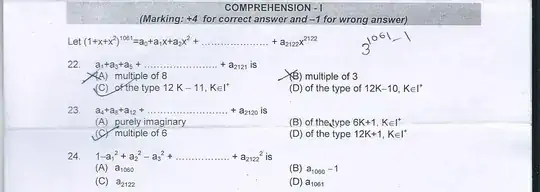So you have
$$(1+x+x^2)^{1061} = a_0 + a_1 x + a_2x^2+\cdots+a_{2122}x^{2122} \tag{1}$$
$$\implies x^{2122}(1-\tfrac1x+\tfrac1{x^2})^{1061} = a_0x^{2122} - a_1 x^{2121} + a_2x^{2120}-\cdots+a_{2122} \tag{2}$$
Multiplying $(1)$ and $(2)$, from the product of RHSs we get that $a_0^2-a_1^2+a_2^2\cdots+a_{2122}^2$ is the coefficient of $x^{2122}$ in the expansion of $LHS_1\cdot LHS_2=(1+x^2+x^4)^{1061}$, which is the same as the coefficient of $x^{1061}$ in the expansion of $(1+x+x^2)^{1061}$, which is $a_{1061}$.
 $(1+x+x^2)^{1061}=a_0+a_1x+...+a_{2122}x^{2122}$
then what is the value of $(1-a_1^{2}+a_2^{2}-a_3^{2}...)$ in terms of single $a_n$ ?
n lies between 0 and 2122
. how to get in terms on $a_n$ ?
Hints and suggestions please!Help!
$(1+x+x^2)^{1061}=a_0+a_1x+...+a_{2122}x^{2122}$
then what is the value of $(1-a_1^{2}+a_2^{2}-a_3^{2}...)$ in terms of single $a_n$ ?
n lies between 0 and 2122
. how to get in terms on $a_n$ ?
Hints and suggestions please!Help!